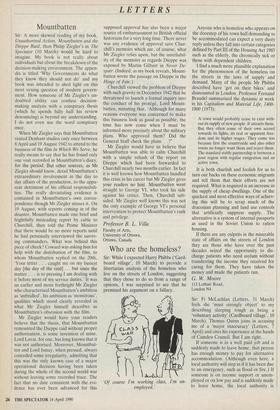LETTERS Mountbatten
Sir: A more skewed reading of my book, Unauthorised Action, Mountbatten and the Dieppe Raid, than Philip Ziegler's in The Spectator (10 March) would be hard to imagine. My book is not really about individuals but about the breakdown of the decision-making environment. The appen- dix is titled 'Why Governments do what they know they should not do' and my book was intended to shed light on this most vexing question of modern govern- ment. How someone of Mr Ziegler's un- doubted ability can confuse decision- making analysis with a conspiracy thesis (which he spends fully half his review denouncing) is beyond my understanding. I do not even use the word conspiracy once.
When Mr Ziegler says that Mountbatten visited Denham studios only once between 8 April and 19 August 1942 to attend to the business of the film In Which We Serve, he really means to say that he has found only one visit recorded in Mountbatten's diary, for the period. But other sources, as Mr Ziegler should know, detail Mountbatten's extraordinary involvement in the day to day affairs of the production, to the appa- rent detriment of his official responsibili- ties. The really devastating evidence is contained in Mountbatten's own corres- pondence though Mr Ziegler misses it. On 19 August, with reports coming in of the disaster, Mountbatten made one brief and frightfully misleading report by cable to Churchill, then told the Prime Minister that there would be no more reports until he had personally interviewed the surviv- ing commanders. What was behind this piece of cheek? Coward was asking him for help with the distribution of the film, to whom Mountbatten replied on the 20th, 'Your letter . . . caught me on my busiest day [the day of the raid] ... but since the matter . . . is so pressing I am dealing with it before most of my service duties.' It was an earlier and more forthright Mr Ziegler who characterised Mountbatten's ambition as 'unbridled', his ambition as 'monstrous', qualities which stood clearly revealed in what Mr Ziegler himself describes as Mountbatten's obsession with the film.
Mr Ziegler would have your readers believe that the thesis, that Mountbatten remounted the Dieppe raid without proper authorisation, is some invention of mine. Lord Lovat, for one, has long known that it was not authorised. Moreover, Mountbat- ten and Lord Ismay, when pressed, always conceded some irregularity, admitting that this was the only known case of a major operational decision having been taken during the whole of the second world war without leaving some recorded trace. The fact that no date consistent with the evi- dence has ever been advanced for this
supposed approval has also been a major source of embarrassment to British official historians for a very long time. There never was any evidence of approval save Chur- chill's memoirs which are, of course, what Mr Ziegler relies upon, but the unreliabil- ity of the memoirs as regards Dieppe was exposed by Martin Gilbert in Never De- spair. (Indeed, as my book reveals, Mount- batten wrote the passage on Dieppe in the Hinge of Fate.)
Churchill viewed the problem of Dieppe with such gravity in December 1942 that he threatened to launch a formal inquiry into the conduct of his protégé, Lord Mount- batten, minuting that, 'Although for many reasons everyone was concerned to make this business look as good as possible, the time has now come when I must be informed more precisely about the military plans. Who approved them? Did the General Staff check the plans. . .?'
Mr Ziegler would have us believe that Mountbatten was able to calm Churchill with a simple rehash of the report on Dieppe which had been forwarded to Churchill nearly two months earlier. In fact it is well known how Mountbatten handled this crisis in his career but Mr Ziegler gives your readers no hint. Mountbatten went straight to George VI, who took his side against his critics. Then, Churchill sub- sided. Mr Ziegler well knows this was not the only example of George VI's personal intervention to protect Mountbatten's rank and privilege.
Professor B. L. Villa
Faculty of Arts, University of Ottawa, Ottawa, Canada


















































 Previous page
Previous page